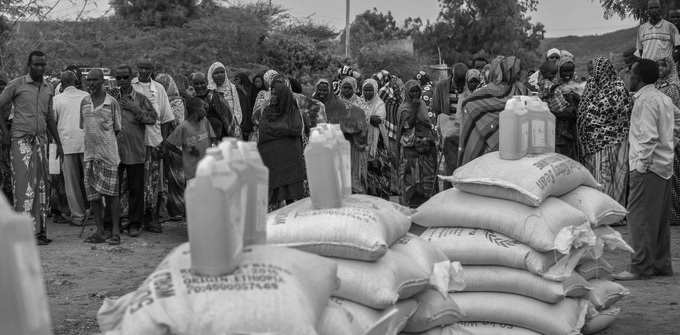
Ethiopia is a country affected by the recurrent drought. However, the country has been responding to such a daunting phenomenon by establishing National Disaster Risk Management Commission. Unless things are out of its control, the commission always attempts to withstand the adverse effect of the drought.
Commission Public Relations Director Debebe Zewde recently told The Ethiopian Herald that more than 8.3 million people have been affected by natural and man-made disasters by the year 2018/19. Of which 5.5 million people were affected by the drought caused by El-Nino.
The remaining 2.8 individuals are displaced as a result of man-made disasters. Taking the lion’s share, the government has been doing its level best to assist the victims. All of the affected population has been getting assistance from the government, the World Food Program (WFP) and a coalition of NGOs.
But still, over 1.34 billion USD is needed to reverse the occurrence all over the country and the commission has recently called upon international donors to lend their hands.
The government of Ethiopia has allocated 346 million USD and bought wheat both from local and foreign suppliers. So far, there is no food shortage in areas where the assistance is being dispersed. If the disaster occurs, the incumbent and volunteers show unreserved commitment to reverse the scenario.
Since 2010, the drought has been repeatedly affecting various parts of the country. El-Nino and local displacement resulted from ethnic conflict are the major causes. Within this difficult scenario, the nation is doing its level best to reverse the situation.
The nation should raise its reserve of emergency food so as to fix the problem in time. Drought is not an intended phenomenon; it occurs every year due to climate change. Since 2010, for instance, the number of people who have been exposed to the recurrent drought has not declined from 10.2 million. Here, it is vital to develop the capability of preventing disasters before it happens than enhancing emergency prevention capacity. In order to strengthen preventive measures, investing in development is quite imperative using the resources available at hand.
For instance, efforts are being exerted to terminate wheat importation through enhancing wheat productivity in the pastoral community. “We have rivers which flow year to year, thus, we haven’t enough reasons to be exposed for food deficiency,”Debebe said.
Furthermore, members of society have been supporting the effort to withstand man-made disasters. What is more, the team led by high government officials is now visiting disaster-affected areas. As part of the effort to rehabilitate the displaced people, the commission has been undertaking the purchase of iron sheet and plastics to rehabilitate displaced households to make use of the rainy season for agricultural activities.
Besides providing various support, the government has been striving to resettle the displaced people. For instance, various house equipment been provided to the people displaced from the Zonal Administration of West Gonder, Amhara State. A day-long telethon program enabled the country to collect 600 million Birr. What is more, the Ministry of Defense on its part has been doing various tasks to stabilize the area.
Accordingly, the government has been providing assistance for more than 5 million people and over 1.8 million people are also receiving assistance from World Food Program (WFO), the remaining 1.2 million people are getting assistance from NGOs coalition. The commission is providing assistance to the people displaced from Amhara, Oromia, SNNP states.
The world vision has also distributed various assistance for more than 311,000 displaced people. Presently, the first round of support has been provided to 8.3 million people. What matters the most is its continuity. “For this, we urged the world to provide additional support.”
Aeneas Chuma, the United Nations Resident and Humanitarian Coordinator said “We acknowledge and appreciate the Government’s leadership in addressing the needs of people affected by crisis across the country. We also recognize the daunting challenges ahead and the urgent need to widen the magnitude of the assistance.”
Chuma also said International humanitarian partners are committed to continuing to closely work with government and provide timely assistance to the affected people based on their needs. “This is the humanitarian imperative we abide by, and a testament of our commitment and partnership with the people and government of Ethiopia,” he added.
Thanks to the leadership of the government and the generous support from donors and friends of Ethiopia, the multi-sector life-saving assistance has helped mitigate the worst effects of the humanitarian crisis in 2018. Donors have contributed 595 million USD for the 2018 response. “I call upon the international community to continue their generosity and provide the required resources in time to help the most vulnerable people,” said Mr. Chuma.
The Ethiopian Herald May 2/2019
BY GIRMACHEW GASHAW




